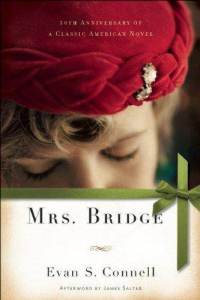 When the Spring/Summer 2010 issue of Ninth Letter rejudged the National Book Award of 1960, the new panel of writers -- Steve Almond, Sarah Shun-lien Bynum, Brock Clarke, and Michael Griffith -- awarded the prize not to the historical winner, Philip Roth's Goodbye, Columbus, but to Evan S. Connell's Mrs. Bridge, a novel I'd never heard of outside of a vague recollection of a Paul Newman-Joanne Woodward film I hadn't seen. The judges gave a panel on their process at the AWP Conference in DC last February, and the case they put forth for Mrs. Bridge so struck me that I immediately put it on my reading list. Here was a book praised for its endurance -- a story about an affluent and proper, but strangely listless, Kansas City housewife that nonetheless manages, in its crisp style and personal focus, to feel as much of our time as it is of India Bridge's 1930s or Evan Connell's 1950s. Months later, I devoured the book over a long August weekend in Vermont. The judges were right. Mrs. Bridge -- for India is a name from which she feels tellingly alien -- hardly knows herself. And yet, through Connell's 117 "chapterlets," many no longer than a page, we come to know her fears and preoccupations -- a distant but devoted husband, a trio of mysterious children with minds of their own, the embarrassment of having too much money and not enough to do -- which are, after all, the fears and preoccupations of many a modern, upper-class American. Of course there are discussions of laundresses, hats, and electric toasters that place the book in its time, but none of these details can really be accused of "dating" it. When the book happens upon a particular historic moment or reality -- the Nazi invasion of Poland, for instance, or de facto segregation of blacks and whites -- it does so in such a way that practically reintroduces those particulars to the reader of fifty years later, even as we know exactly where everything is headed. Like Salinger, Connell deftly mixes ironic detachment with unmistakeable tenderness in his portrait of this lady. The result is a character whose innocence is a genuine revelation. (Unlike, say, the underwritten Betty Draper in AMC's "Mad Men," a latter-day cousin who in the hands of January Jones is a genuine irritation.) This is not a novel that overturns our assumptions about bland, dignified surfaces. Mrs. Bridge feels as empty as she appears, but that's what makes her portrait so heart-breaking and (remarkably) not the least bit condescending. She knows something is wrong, but how on earth can she fix it? She doesn't really know what it is. In her passiveness, her inarticulateness, and her conservatism, she is as lovable as she is unforgivable. For more on Evan Connell, here's the excellent Mark Oppenheimer in The Believer. Great stuff here, particularly in the comparison to The Remains of the Day. Obviously, Mr. Bridge, that distant husband, is going be added to my list.
1 Comment
Wes
8/15/2011 12:16:54 am
No love lost seeing the prize awarded to someone other than Roth...the man's a great writer, but I hated Goodbye, Columbus.
Reply
Leave a Reply. |
Aboutauthor of The Violet Hour, reader, prodigious eater of ice cream Archives
June 2014
Categories
All
|
 RSS Feed
RSS Feed